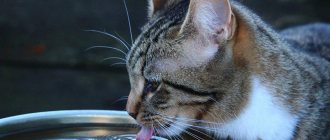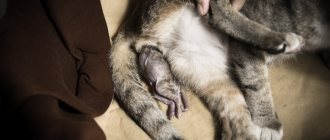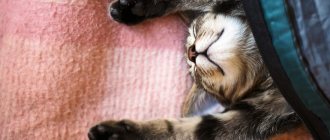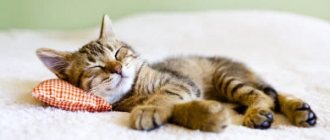It seems to us that the cat sleeps most of the day and this is partly true - the norm for a pet is up to 20 hours a day. Her sleep is periodically interrupted by physical activity, eating, and licking. The duration of wakefulness depends on the breed and age of the individual.
Many owners have thought more than once that it would be nice to sleep as much as cats. Of course, no one has seriously tried to do this; such a regime is not suitable for an adult and healthy person. Therefore, you should not envy your furry friends - they do this not out of whim, but because of their nature.
How long does a kitten and an adult cat sleep?
As a pet gets older, its sleep patterns change. A newborn kitten wakes up for a total of one hour a day to feed. The rest of the time he sleeps, gaining strength. The body gradually develops and requires movement and other physical activity.
On average, in 4-5 months the kitten has matured enough and begins to sleep on average as much as an adult cat.
The duration of sleep for a little pet depends on the following factors:
- Age. Kittens and older individuals sleep more than healthy individuals of reproductive age.
- State of the nervous system. An excited cat has difficulty falling asleep. If for some reason the cat has not fed the offspring, it will make noise and become restless. Well-fed babies usually pass out immediately after eating, warmed by their mother's fur.
- Environment. Animals need a private place to rest. Pets will sleep longer and more peacefully in a quiet apartment. If kittens are weaned from their mother, you need to provide them with a comfortable box or buy a special cat house.
An active young cat can sleep from 14 to 22 hours a day. The regime is determined by his lifestyle. Outdoor cats need to be cared for and find shelter, which takes a lot of time. In a warm apartment there are no such worries, so he can afford to bask with breaks for lunch and communication with the owners.
Why do cats sleep during the day and are active at night?
Cats are naturally predators. Most predatory animals go hunting at night.
Thanks to the special structure of their eyes, cats see perfectly in low light conditions, which allows them to navigate well in the dark and hunt at night.
In addition, most cats often sleep during the day because they are bored. Owners who are bothered by their furry pets at night often ask how to change their cat's sleep patterns.
First of all, you need to pay attention to it. During the game, call the cat by name. A cat that has expended enough energy throughout the day is unlikely to disturb the household at night.
For those who have little free time, you can purchase special battery-powered toys or electronic entertainment systems.
Mister Cat explains why cats sleep so much
The average sleep norm for a cat is 2 and a half times higher than that of a human. This high duration is due to the following reasons:
- Age. Month-old kittens and elderly pets sleep more than young and healthy individuals.
- Breed. Scottish and British cats may fall asleep immediately after eating. More active, for example, Abyssinians, in physical activity. Therefore, they will prefer games or contact with their owners to sleep.
- Condition of the body. If your cat's routine has changed - she begins to sleep a lot or, conversely, stays awake more - this may indicate health problems. It is better not to delay a visit to the veterinarian for examination and diagnosis.
- Accommodations. A pet may not get enough sleep if its neighbors bother it. It is important that the environment does not create reasons for the animal to become agitated. This also applies to other pets. They may need a break from each other.
The effect of cat breed on sleep duration
Cat breed has a significant impact on behavior and sleep duration. This is due to different types of higher nervous activity and temperament. Thus, easily excitable pets (mainly Oriental, Asian and Siamese-Oriental breeds) sleep a couple of hours less than the average table values.
Phlegmatic - calm cat breeds (Persian, Maine Coon, Siberian, British, Scottish, etc.) can sleep several hours longer than average.
The duration of sleep reflects the health of the pet. A caring owner should regularly monitor the pet for such violations. They are often caused by discomfort or pain. It is especially important to monitor the sleep of newborns and growing kittens.
How and where does a cat sleep?
There is an opinion that the position and place in which a cat falls asleep speaks about its mood and attitude towards its owners. You can find the cat lying on its back with its paws comically outstretched.
If a pet sleeps without covering itself and without trying to camouflage itself against the background of surrounding objects, it means that it trusts its neighbors and does not expect a trick or a sudden attack from them.
In this case, it is better not to deceive the cat’s expectations and not to disturb her for no reason. Like any living creature, she needs personal space and peace.
Sleeping next to the owner, especially at night, is also considered a sign of openness and trust. True, such behavior can be interpreted as a desire to warm up.
After a hearty dinner, a domestic cat usually immediately goes to bed. For these purposes, he may choose not the most obvious places. Do not be surprised if the animal considers an empty glass vase, sink or dining table to be its bed. It is unlikely that people will ever find out what really motivates cats that fall asleep in unusual places.
What to do if your pet sleeps too much
If long sleep does not fit into your pet’s daily routine, but he suddenly begins to rest for a long time, you should be wary and also take a closer look at his health. In addition to drowsiness, the disease is indicated by the presence of the following symptoms:
- increased water consumption or refusal of it;
- lack of appetite;
- lack of response to external stimuli;
- diarrhea;
- vomit;
- false urge to urinate.
The presence of at least one of the listed symptoms indicates the need to visit a specialist. If these symptoms are not present, it may be due to the weather: cats, like people, can be weather dependent and feel sleepy on certain days.
Many people know that any cat spends most of its life sleeping. Scientists have calculated how many hours cats sleep per day. On average, our little brothers are willing to spend from 16 to 20 hours a day on their favorite activity, which is almost 80% of the time.
Moreover, there are no gender differences in this addiction - cats sleep as much as cats. Only possums and bats can compete with them in their passion for prolonged passive rest.
The reason for this behavior is explained by animal physiology. Any representatives of the cat family are predators by nature, although due to evolutionary changes and domestication, many of them have lost the behavioral traits characteristic of predators, they have retained the desire to accumulate strength. Like any predator, a cat is active while it is hungry, and passive when it feels full.
They show maximum activity during hunting hours - this is the twilight period at sunset and dawn. In a short time, they expend a huge amount of energy in order to catch up, grab and kill their prey. The cats spend the rest of their time recuperating and preparing for the next run.
One of the reasons why cats sleep for several hours during the day is simple boredom. These very smart and inquisitive animals need a “change of scenery” and new experiences. Living in a house where the environment does not change so often, animals quickly become bored. And the best way to “escape reality” is to get a good night’s sleep.
Cat sleep phases
Cats, like other mammals, have two stages of sleep: fast and slow sleep.
The first is characterized by muscle relaxation and increased brain activity. At the same time, movements of the eyeballs are observed. There is a theory that at this time the beast dreams. In the mid-20th century, experiments were carried out, during which it was found that most likely cats dream of hunting, toileting and other everyday activities.
The slow phase is accompanied by complete relaxation of the body. At this time, the animal gains strength.
Energy saving
Cats have the habits and physiology of a predator, so their bodies are ideally suited for chasing and hunting - mainly during twilight. Big cats such as tigers and lions have a similar sleep-wake pattern—they sleep during the day and hunt at night.
Even though cats are domesticated, their wild instincts are still largely intact. Even in games, cats, obeying their primal instincts, love to crawl in the shadows and quickly attack their target.
Hunting and chasing require a surprising amount of stamina and energy. Whether it's chasing prey or simply playing with a toy, it all requires a lot of effort, so the cat stores energy during its long sleep.
Stages
The pet's sleep process is divided into the following stages:
- Nap. The body remains conscious and alert during rest. In the event of an unexpected threat, the animal reacts instantly.
- Shallow sleep. The body rests, but hearing is preserved.
- Deep dream. Muscle tension disappears, short nerve impulses may be observed, due to which the muscles contract and the paws twitch.
- REM phase. The eyes move behind closed eyelids, there is a high probability of dreaming.
The first two stages last about half an hour, followed by 5-7 minutes of a deep phase, which again gives way to sleep. This alternation of stages of sleep allows the animal not to lose vigilance and control the situation around itself at all times.
Kitten comfort and sleep
The little furry's sleep also depends on the environment and psychological state. If the atmosphere at home is calm, there are no sharp, loud sounds, then the kitten is comfortable and feels safe. Then his rest will be serene and the kitten’s sleep will be deep, long, he will sleep peacefully.
Screaming and scandals do not contribute to a calm mental state of the pet and can significantly affect his sleep.
Let us also note the factor that the correctly chosen baby bed is also responsible for comfort. A feeling of security will help create a small soft house where he can hide and sleep sweetly.
© shutterstock
If your cat is constantly sleeping
Usually, owners know how much sleep is the daily norm for their cat. When an active pet noticeably loses its vitality and indulges in rest more often than usual, you should take care of its health.
The same applies to increasing the waking phase. This phenomenon may indicate problems with the thyroid gland.
With proper care and suitable conditions, sound and healthy sleep prolongs the animal’s life, allows it to develop harmoniously and delight its owners with its company. If there are problems with the regime, it’s time to show the animal to the veterinarian.
Long sleep and its causes
There are several reasons for prolonged sleep. If they are not associated with general lethargy and refusal to eat, then they are considered normal.
Cats are naturally very active. It is vital for them to replenish their strength and sleep is the best medicine for this.
Again, returning to natural premises, it should be noted that in nature, cats are predators. Their main diet consists of food rich in proteins. Pets also eat mainly protein foods, which require a long time to digest.
After sterilization, your cat may sleep longer than usual.
What you need to know about cats sleeping?
It is useful to know not only how much cats sleep, but also how and why they sleep and what deviations there may be. This will help you better understand your pet and react faster in case of possible problems.
What to do if your cat snores?
When cats fall asleep, they may wheeze or snore. There is no need to worry if your pet wheezes or snores. Snoring itself is not a disease. For example, cats that belong to breeds with a short muzzle snore due to the structural features of the nasopharynx. These breeds include Persians, Exotics, Devon Rex, American Burmese, etc.
Snoring can be a symptom of other diseases. For example, overweight cats often snore. Snoring may indicate bronchitis, broken ribs, swelling of the larynx due to an allergic reaction, and even heart disease. You need to worry and visit a veterinarian if, in addition to snoring, there are also the following symptoms:
- partial cessation of breathing during sleep,
- loss of appetite,
- sneezing and coughing,
- swelling on the face,
- the cat is trying to breathe through its mouth.
Do cats dream?
Scientists have found that only mammals have a REM sleep phase. At this stage, the brain is very active, and the eyes move quickly. This stage of sleep is otherwise called the rapid eye movement phase. It is during this phase that we dream. Research confirms that the brain activity of different mammals is similar during REM sleep. That is, the brain activity of cats and people in this phase is also similar. This means that cats dream.
Why are cats active at night?
Many owners are angry because their pets prefer to be active at night. Many explain this by the fact that cats are nocturnal animals. In fact, this is not entirely true: cats are more likely to be crepuscular animals.
Often kittens that move to a new home do not come out of hiding until the early morning. This behavior is inherent in cats by nature. Cats see well in limited light, which is an advantage for them when hunting. That's why domestic cats, obeying instinct, get up in the pre-dawn hours.
What to do if your cat won't let you sleep at night?
Cats live according to a certain schedule, and this schedule can be changed so that your pet does not interfere with your sleep at night. This is quite easy to do.
- Give your cat something to do during the day. Especially if you spend most of the day at work. Provide your pet with toys, including interactive toys.
- In the evening, be sure to play active games with your cat. Simulate a hunt: chase a cat with a laser pointer or play with feathers with a fishing rod. Satisfy the hunter's instinct.
- Feed your pet at the same time, shortly before you go to bed. Since cats are obligate carnivores, the best food for them is food based on fresh meat, for example, SUPERPET. Such food is well digested, and the cat is satisfied.
- A well-fed and well-fed pet will relax and begin to wash itself. This is part of its natural cycle, which we talked about at the beginning. After washing, the cat will go to bed.
If your cat wakes up during the night and demands your attention, ignore it. You can’t not only stroke or feel sorry for the cat, but also scold it. Any reaction from the owner is attention. If you encourage nocturnal behavior, even with disturbances, your cat will continue to bother you at night.
Remember that age also plays a role: kittens are often active at night, they do not yet have an established routine. You just need to endure this period, but from childhood you should be accustomed to the fact that no one pays attention to your pet at night.
When should you worry?
Now you know how much cats sleep on average. But what if your pet sleeps longer or shorter? Each cat is individual, and each animal’s sleep standards are also different. If your pet always sleeps for about 17 hours at night, most likely this is his norm.
You need to worry if your cat sleeps longer than normal and at the same time becomes weakened and apathetic. Such symptoms may be signs of arthritis, diabetes, or infections.
If your cat sleeps less than normal, this may indicate pain. At the same time, the cat becomes restless and may lose appetite. In this case, you should take your pet to a doctor to rule out injuries and other health problems.
Changes in sleep duration are not always alarming signals. Cats sleep less if the amount of food they eat decreases. This can happen if your pet is obese and you have reduced his portion to control his weight.
Many people think that cats sleep a lot because they are lazy. Now you know that this is not true. The behavior of cats is due to their predatory nature. Your cat's long sleep is not a sign of laziness, but another evidence that a real small predator lives in your home.
Did you like the article? Share with your friends:
Do cats dream?
In the middle of the last century, scientists found that mammals dream in the REM sleep phase. At this time, the muscles are paralyzed by the varolian trunk of the cerebral cortex, which does not allow the body in reality to repeat the movements seen in a dream.
The pons contains nerve fibers that connect the two halves of the cerebellum
In 1965, somnologists from France Michel Jouvet and J.-F. During an experiment, Delorme removed the varicose veins of cats and obtained an interesting result. In the dream, the cats began to move in space, show aggression, move as if they were hunting, and rush at invisible mice. At the same time, they ignored real mice, which suggests that at those moments the cats were in the world of dreams.
After Jouvet and Delorme, neurophysiologists from the University of Lyon began studying the dreams of cats. Their research showed that most cat dreams involve various emotions, exploration, personal hygiene and hunting.
Favorite vacation spots
Cats choose a place to sleep carefully: it should be quiet, comfortable and cozy. It is important for an animal to always have access to its favorite place and know that it will not be disturbed there. That’s why your furry pet often chooses secluded corners for relaxation: armchairs, sofas, beds, and even the shelves of an open wardrobe. Cats usually have several favorite places, which they happily alternate. Despite the careful choice of sleeping place, sometimes pets sleep where they fell asleep after a hearty lunch. For example, on the floor, on the refrigerator or in other unusual places.
Sometimes cats choose unusual places for bed
A cat's dream close to its owner speaks of sympathy and affection. Pets love to settle next to a person while sleeping: at the head of the bed, at the foot of the bed, at arm's length, or on the owner himself. Sometimes, when choosing a place to rest, a cat is guided by the desire to be closer to the warmth, and therefore settles down near the heaters.










